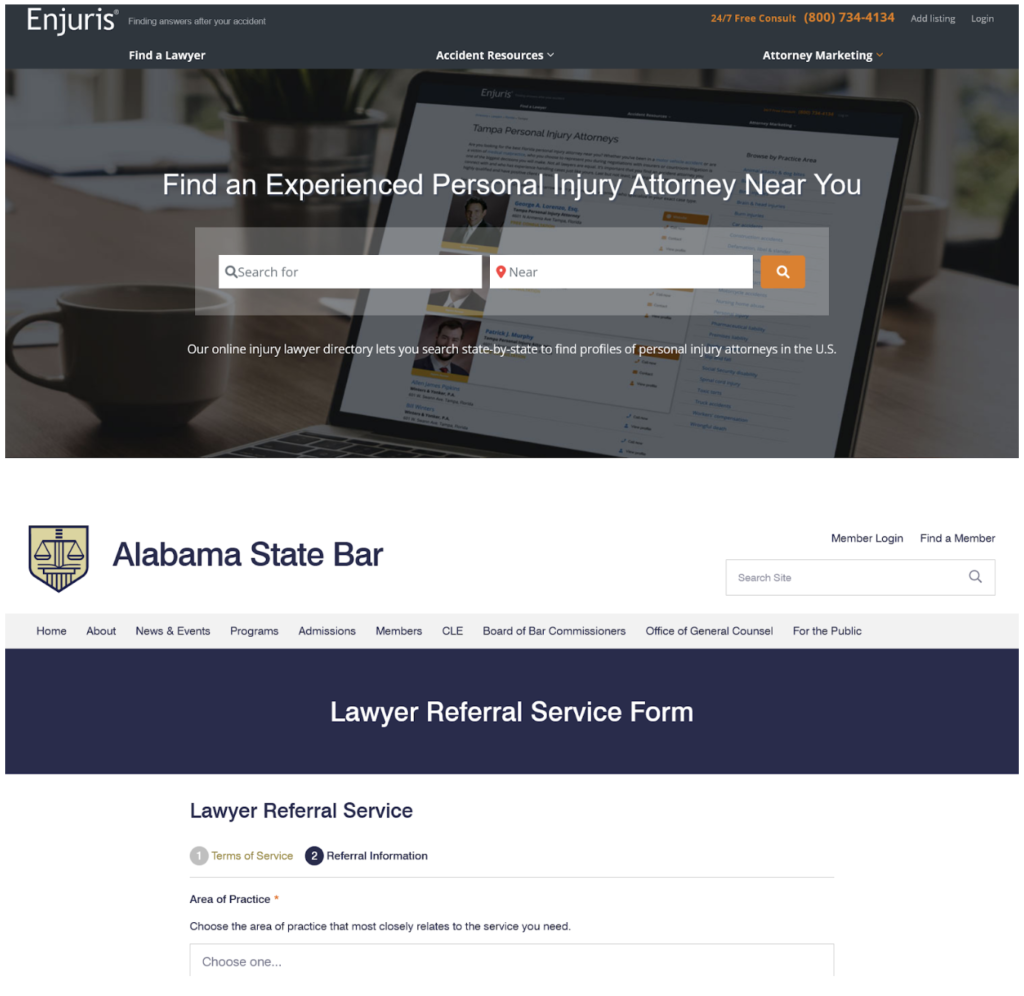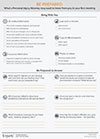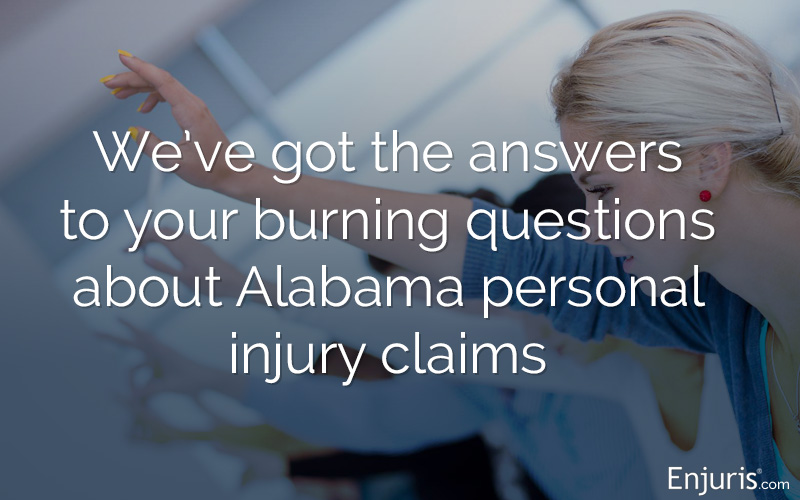Top 10 Alabama personal injury FAQs
The legal system is complicated. Lawyers aren't even allowed to practice law until they graduate from law school and pass a notoriously difficult bar exam.
The bottom line: You shouldn't feel bad if you have questions about personal injury lawsuits.
At Enjuris, we believe knowledge is power. With that in mind, here are the answers to 10 of the most common questions about Alabama personal injury lawsuits.
What is a personal injury lawsuit?
A personal injury lawsuit is a lawsuit that's filed when a person suffers physical or mental harm as a result of someone else's actions or inactions.
Contrary to popular belief, personal injury lawsuits do NOT include lawsuits based on damage to a person's property. This distinction is important, as many of the procedural rules that apply to personal injury lawsuits don't apply to property damage lawsuits.
Common sources of personal injury lawsuits include:
How do I start a personal injury lawsuit?
A personal injury lawsuit commences when you:
- File a complaint with the proper court and pay the associated filing fee, and
- Serve the defendant with a copy of the complaint and summons.
A complaint (sometimes called a claim for relief) sets forth the facts showing that the plaintiff is entitled to damages and the amount of damages the plaintiff is seeking. A summons is simply a document that notifies the defendant that they're being sued.
When it comes to serving a defendant, you must have a sheriff or licensed process server complete service and file a proof of service statement.
Once the defendant receives the complaint, they'll have a certain amount of time to respond (i.e., “answer”) the lawsuit.
Where do I file a personal injury lawsuit?
The vast majority of Alabama personal injury cases will be filed in the Alabama circuit court located in the county:
- Whether the accident occurred, or
- Where the defendant resides.
A personal injury lawsuit can be filed in small claims court if the amount in question (i.e., the damages sought by the plaintiff) is less than $6,000. Small claims courts are relatively informal and inexpensive. Most parties are NOT represented by attorneys in a small claims court.
Do I need to hire a lawyer to handle my personal injury lawsuit?
A lawyer is by no means required to pursue a personal injury lawsuit. In small claims courts, lawyers are rarely used. However, it's generally a good idea to hire an attorney to handle your personal injury lawsuit if any of the following are true:
- You suffered significant physical or mental injuries,
- You think there may be future damages (such as future medical expenses), or
- The defendant is represented by an attorney.
Most initial consultations are free, which means you can decide whether you need to hire an attorney after meeting with an Alabama personal injury attorney to discuss your case.
Should I accept a settlement offer?
The decision to accept or reject a settlement offer from an insurance company or defendant is a decision that belongs to YOU. This is true even if you’re represented by an attorney.
A lawyer's job is to advise; it's the client's job to decide.
Before accepting a settlement offer, here are some things to consider:
- You can reject a settlement offer and still receive a fair settlement. Most attorneys will tell you that an initial settlement offer is merely the start of negotiations. With that in mind, initial settlement offers are often lowball offers. Insurance companies and defendants typically expect you to make a counteroffer.
- Personal injury expenses can last a lifetime. Settlement offers are often based on your current situation. But what about your future? Do you know the full extent of your injury? Will your injury require future treatment? Will the necessity of future treatment impact your annual wages? Make sure you consider all of the consequences of your injury before accepting a settlement offer.
- Personal injury attorneys have experience valuing cases. It's always a good idea to have an attorney review a settlement offer you're considering. Not only can the attorney make sure the proper legal language is included in the settlement documents, but the attorney can tell you whether the settlement offer is reasonable based on the facts of your case and the outcomes of similar cases.
How much money can I recover if I file a personal injury lawsuit in Alabama?
Alabama allows plaintiffs in personal injury cases to recover the following damages:
- Economic damages represent the objectively verifiable monetary losses caused by your accident (medical expenses, lost wages, etc.)
- Non-economic damages represent the nonmonetary losses caused by your accident. These damages are very real but hard to quantify (pain and suffering, loss of consortium, etc.).
Like most states, Alabama limits the amount of damages you can receive in certain types of cases.
There are only 2 damage caps in Alabama:
- Compensatory damages in wrongful death cases. Alabama is the only state in the country that denies recovery for compensatory damages (economic and non-economic damages) in wrongful death claims. Only punitive damages are recoverable in wrongful death cases.
- Punitive damages in civil actions. Punitive damages in civil actions that do not involve physical injury must not exceed 3 times the amount of compensatory damages or $500,000, whichever is greater. With respect to civil actions that do involve physical injury, punitive damages must not exceed 3 times the amount of compensatory damages or $1.5 million, whichever is greater.
What if I’m partially at fault for my Alabama accident?
To recover damages in an Alabama personal injury lawsuit, you need to prove that someone else was at fault for your accident.
Typically, this is done by establishing the elements of negligence:
- The defendant owed you a duty of care. Generally speaking, most people owe a duty to exercise reasonable care to avoid harming others.
- The defendant breached their duty. To prove that a defendant breached their duty, you will have to show that the defendant failed to exercise reasonable care. For example, you might show that a driver ran a red light or was texting while driving when the accident occurred.
- You were injured as a result of the defendant's breach. It's not enough that the defendant failed to exercise reasonable care; you must also prove that their failure caused your accident.
However, accidents aren't always the fault of just one person. What if you're partially to blame for your accident?
Alabama is one of the few pure contributory negligence states. This means that if a plaintiff is even 1 percent responsible for causing their injuries, they're barred from recovering ANY damages.
How much does an Alabama personal injury attorney cost?
Most personal injury attorneys in Alabama handle cases on a contingent fee basis. In short, this means the lawyer takes a certain percentage (typically 20-40 percent) of whatever damages you recover. If you don't recover any damages, you don't owe your lawyer a dime.
Alabama doesn't cap the percentage an attorney can receive under a contingent fee agreement, but the Alabama Rules of Professional Conduct require the arrangement to be reasonable and in writing.
How long do I have to file a lawsuit?
Alabama has a 2-year statute of limitations for personal injury lawsuits. This means you typically have 2 years from the date of the accident to file a lawsuit. If you fail to file your lawsuit within this time period, your claim will be forever barred.
There are some rare exceptions to the 2-year statute of limitations, so it's always a good idea to talk to an attorney about your case, even if you think the statute of limitations may have expired.
How do I find a personal injury attorney in Alabama?
There are almost 15,000 active attorneys in Alabama.
Legal directories, including the Enjuris Legal Directory and the Alabama State Bar Directory are great places to find an experienced personal injury attorney.

But you don’t want to find just any attorney; you want to find the right attorney. With that in mind, it’s always a good idea to schedule an initial consultation with an attorney you’re considering hiring. Initial consultations are free and they give you a chance to find out if the attorney is a good fit.
To aid in this process, here are a couple of helpful resources:

A worksheet to prepare for your first meeting with a personal injury attorney – what to bring, what they'll ask
Download in PDF format

Worksheet with questions to ask a personal injury attorney to help determine if he or she will be a good fit for your case
Download in PDF format
See our guide Choosing a personal injury attorney.


